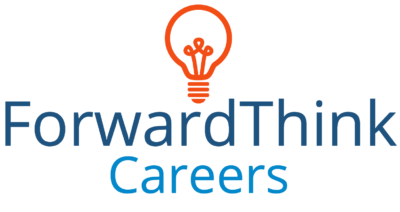

Networking. Say this word to a job seeker and watch his face contort. It sounds so…exhausting. Can’t you just hide behind your computer screen and toss out random LinkedIn connection requests?
Nope! Sometimes you need to get out in the BIG, BAD world and put in some face time, so that you’re tapping the hidden job market.
But nothing strikes more terror in the hearts of job seekers than the image of wandering around a stuffy, high-pressured event, not knowing who to talk to or what the heck to say! It’s easy to get caught up in the many myths of in-person networking. I’m here to dispel those silly things. Here goes:
Networking Event Myth #1: Networking means going to a formal event in a business suit.
If you have nightmares of wearing a name tag on your blazer lapel and carrying around a stack of resumes, fear not! This ain’t your grandpa’s networking event. First of all, networking doesn’t have to take place at a formal function. It can happen at a friend’s dinner party, neighbor’s BBQ, niece’s birthday celebration, or at your local bar. Any place where people gather is a potential networking opportunity.
Aside from social events put on by your friends and family, Meetup.com is a great resource for finding local events. You can browse by location and interest. It’s helpful to see if there are groups related to your profession or industry, but don’t stop there. Joining groups based on hobbies, outdoor activities or cultural events can be just as effective.
Also, look up local professional associations to see if they’re having any events or mixers. Your local Chamber of Commerce can be a useful resource as well. It’s really about finding like-minded people in your industry or the one you’d like to transition into.
Networking Event Myth #2: Everyone at the event is super confident, accomplished…and judgmental.
It can be incredibly intimidating to walk into a room full of strangers. Even if you normally consider yourself pretty outgoing and self-assured, you might be silently asking yourself, “Is everyone staring at me?” Or, “Did I just sound like an idiot?” Seconds later, you’re making a beeline for the bar or bathroom just to avoid the fray.
But it’s helpful to keep in mind that everyone at the event is probably feeling just as awkward. Some people are just better at hiding it than others. And some simply may have more practice.
Remember, people are there because they want to meet and get to know others, just like you do. It requires a certain amount of vulnerability to put yourself out there — so instead of thinking everyone is judging you, assume they’re equally worried about how they’re coming across to you!
I always think it’s best to go to events solo, so that you’re forced to talk to new people and slowly but surely get more comfortable doing so. But if you feel the need to go with a friend, just agree that you’ll split up from time to time and approach new people.
Networking Event Myth #3: You have to spout off a memorized elevator pitch or ask for a job.
So, you have a beverage in hand and have gotten a lay of the land…now what? Networking in 2016 has nothing to do with robotically pitching yourself or telling everyone you need a job. It’s all about making an authentic connection.
Here’s a trick: put the focus entirely on that other person. Ask them where they’re from, how they found out about the event, what they like to do in their spare time, etc. People tend to view others more favorably when they show interest in them. You can make an amazing impression just by genuinely trying to get to the know the person and being a good listener.
What happens when the conversation circles back around, and they ask you the dreaded, “So, what do you do?” No need to launch into a regurgitation of your resume. It’s better to talk about your work in clear, non-jarony terms, like you would with a friend. People tend to be more interested in how you got into your line of work and what you enjoy most. It’s really about storytelling. You can also mention that you’re starting to take steps in another direction and describe what you hope your next position will look like.
Remember, you’re not asking anyone for a job or even for them to help you. They may, of course, mention they know someone they can connect you with. But if not, no problem. You’ll have an opportunity to delve into this further in your follow up. (More on that later.) So keep the conversation light and friendly with plenty of back and forth.
But here’s the most important part: before parting ways, ask to trade business cards with them. (Make sure to include your personal email on your card or purchase personal business cards on sites like vistaprint.com or moo.com.) Which brings us to…
Networking Event Myth #4: Once you go to an event, you’re off the hook.
After attending an event, you might feel like, “Phew, glad that’s over!” But now the most important work begins. Armed with a handful of business cards, send personalized LinkedIn connection requests within 2-3 days. Make sure to mention how nice it was meeting them at the event and include a few things you talked about.
Once they accept your request, you can see if they’re connected to anyone at your target companies. If so, you can ask if they would feel comfortable making an introduction. You can also offer to introduce them to anyone in your network who might be helpful to them. That way it won’t feel so one-sided.
Online professional relationships require a bit of nurturing and consistency, so aim to reach out to them every few weeks. Sending a little social currency in the form of a relevant article can keep the conversation going. (Include a note saying something like, “I saw this article and thought of our conversation. Let me know what you think.”) It’s a good idea to create a spreadsheet to track your connection interactions. That way no one will slip through the cracks.
So, while in-person networking can initially be daunting and little difficult to navigate, the key is to keep going to event after event and be consistent with your follow-up correspondence. Staying top-of-mind with your connections can lead to them referring you to an opportunity or person of interest. And that, my friends, is how the hidden job market is accessed.



